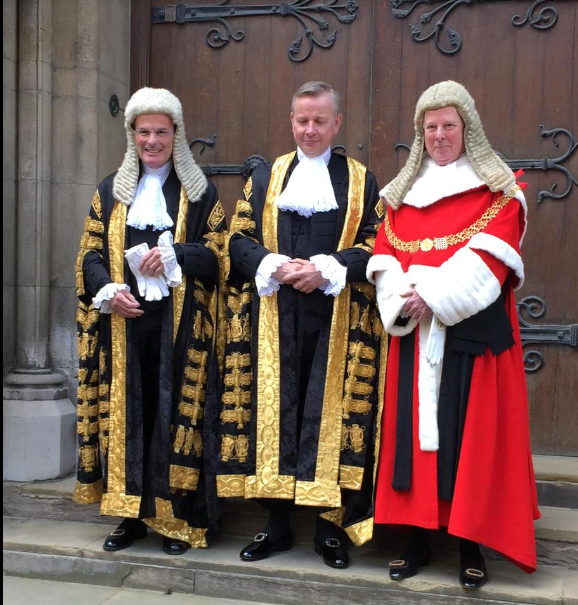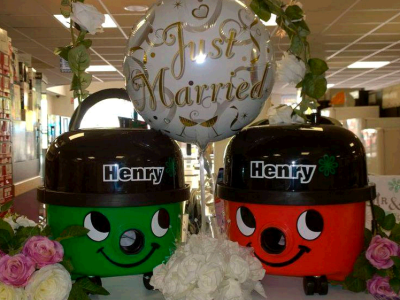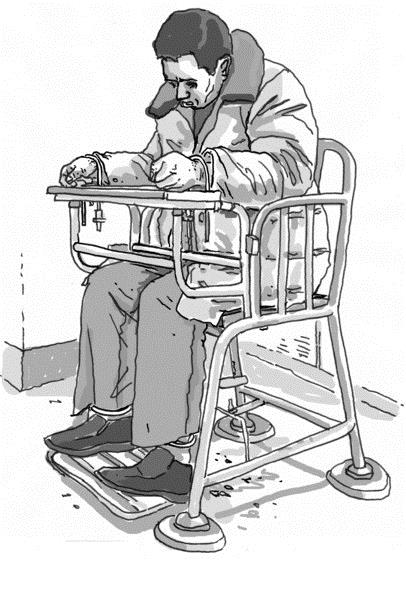Weekly Notes: legal news from ICLR – 22 May 2015
This week’s conversazione in the salon of law and justice includes a ministerial dressing up, an unmade cake that made the law, a turn of the rainbow tide in the Emerald Isle and a bit of a hoo-hah over who does what, in court or out, and whether they should have or not. … Continue reading
This week’s conversazione in the salon of law and justice includes a ministerial dressing up, an unmade cake that made the law, a turn of the rainbow tide in the Emerald Isle and a bit of a hoo-hah over who does what, in court or out, and whether they should have or not.
Installing the new Gove-rnor
This week our new Lord Chancellor and Secretary of State for Justice, Michael Gove, was sworn into office, dressed in the ceremonial robes in which he can be seen here.
He chose, for the same reason as his predecessor, Chris Grayling, to forsake the wig which goes with this getup, on the ground that he is not a lawyer.
For further comments on his appointment, see Weekly Notes – 8 May.
He is flanked in this picture by Lord Dyson, Master of the Rolls, and (in red) Lord Thomas of Cwmgiedd, Lord Chief Justice.
A tale of two Irelands – North and South
Not having your cake or eating it
We began the week with a story from Northern Ireland about a cake. It became known as the Gay Cake, but it wasn’t the cake that was gay and indeed the story itself is quite sad. Particularly sad that what should have been a token of celebration for a special occasion should have caused such a rift in the cultural spectrum as to end up in litigation.
The facts briefly stated were these. A man went into a shop to order a special cake. The shop was a bakery that specialised in producing cakes with icing decorated according to the customer’s design. The shop refused to complete the order. This was held to be wrong.

Now for the facts in slightly more detail, to help make sense of the fuss. A gay man went into a Christian bakery shop to order a special cake to mark the conclusion of Northern Ireland anti – homophobia week. The proposed design included a coloured picture of “Bert and Ernie” (two characters from the Muppet show “Sesame St”), the logo of QueerSpace and the headline caption “Support Gay Marriage.” The woman working in the shop, who was one of its owners, took the order but later contacted the man and said they would after all not be willing to execute it. The design was objectionable to them on religious grounds, because they regarded same-sex unions as sinful. The man had to go elsewhere to get his cake made (which he did). But he brought a claim against the shop.
Giving judgment in Lee v Ashers Baking Co Ltd [2015] NICty 2 (BAILII link) on 19 May 2015, Presiding District Judge Brownlie sitting in the County Court in Northern Ireland held there had been breaches of the Equality Act (Sexual Orientation) Regulations (Northern Ireland) 2006 on the grounds of the plaintiff’s sexual orientation as well as his political opinion, and of The Fair Employment and Treatment (Northern Ireland) Order 1998 on the grounds of religious belief and/or political opinion. Moreover, the defendants were not protected from liability by the right to freedom of religion under article 9 of the European Convention on Human Rights.
She said at para 43:
My finding is that the Defendants cancelled this order as they oppose same sex marriage for the reason that they regard it as sinful and contrary to their genuinely held religious beliefs. Same sex marriage is inextricably linked to sexual relations between same sex couples which is a union of persons having a particular sexual orientation. The Plaintiff did not share the particular religious and political opinion which confines marriage to heterosexual orientation.
The Defendants are not a religious organization; they are conducting a business for profit and, notwithstanding their genuine religious beliefs, there are no exceptions available under the 2006 Regulations which apply to this case and the Legislature, after appropriate consultation and consideration, has determined what the law should be.
It is worth reading the judgment in full, as the judge takes a good deal of care to explain both sides’ point of view and cites quite a lot of authority on the meaning and effect of the Regulations. The case is also reported as news by the BBC and the Daily Telegraph and is the subject of a critical commentary by Darren Newman on his blog, A Range of Reasonable Responses, entitled Can a cake even BE gay? He (while sympathetic to the plaintiff’s cause) criticises the decision by reference to the question of freedom of speech, citing American cases in which printers have been held entitled not to print material they regard as objectionable (though presumably legal, ie not libellous or seditious). I’m not going to get drawn into this argument. Read it and decide for yourself. (I’d just like to register my warm approval of the way that Northern Ireland still uses the expression “plaintiff” for what we, in the Woolf-world of England and Wales, must now call a “claimant”.)
A rainbow sunrise
Heading south, the week ended with a very different, much more upbeat story. For constitutional reasons, the Republic of Ireland was obliged, in order to legislate for same-sex marriage, to hold a referendum to seek the approval of the people. And they gave it. Oh they gave it. The turnout was fantastic – floods of expats returned to the country to take part – and the vote in favour was an overwhelming 62%.
Some pundits began saying that this rainbow revolution represented a second Irish “transformation”; the first being the Europeanisation that occurred when the republic joined the Eurozone and welcomed with open arms its café culture and subsidies. That fell flat a few years later; but for a while the shedding of the “punt” (which was a British pound in all but pronunciation – and value) was a liberating, exit-colonial move. Similarly, this vote has marked a shift away (still further) from the vice-like and often vicious grip of the Irish Catholic Church, mired as it has been in its own sexually oriented scandals. The present Pope has hinted that the vow of celibacy which RC priests are expected to take may one day soon have had its day. It has, apparently, no theological basis, and is not observed by the Orthodox or protestant branches of Christianity. And if it isn’t a scandal in itself, this denial of the human right to sexual expression, it is certainly the cause of many scandals involving others, and with many victims among priesthood as well as laity. If Ireland in its rainbow sexuality is to be comfortable with its somberly-robed priesthood, then they too, of their own or Rome’s accord, will need to consider the implications of this vote.
In the Irish Times, Fintan O’Toole wrote that the vote wasn’t a victory for tolerance. It was better than that.
Tolerance is what “we” extend, in our gracious goodness, to “them”. It’s about saying “You do your own thing over there and we won’t bother you so long as you don’t bother us”.
The resounding Yes is a statement that Ireland has left tolerance far behind. It’s saying that there’s no “them” anymore.
Watching the news it was fantastic to see the happiness of people whose way of love had been endorsed by such a majority of their countryfolk. Several comments on Twitter remarked on this, and compared it to the situation in the UK where, because the law had been changed by the politicians, the people had not had the opportunity to extend their own mandate or blessing. Would they have done the same? Undoubtedly. For in reality, a vote like this can never take a nation backwards. You can’t seriously imagine a popular referendum in a civilised country reintroducing the death penalty, or making homosexual acts in private unlawful, or banning termination of pregnancy even on medical grounds, or declaring the earth to be, in fact, flat. Likewise, you couldn’t imagine this vote in Ireland being a contest between “yes” and “no”. It was always going to be a choice between “yes” or “not yet”.

That said, I realise that I have introduced an important condition: “in a civilised country”. There may be countries where, even now, a popular referendum will re-introduce medievel barbarity and ignorant prejudice. I can’t imagine England ever falling into that description, but those who lived through the 1930s probably can.
It will certainly be interesting to see how Britain responds to its own referendum, in a year or two, on membership of the European Union. Rainbow acceptance – or can we have our cake back and still eat it?
UPDATE From The Independent, this lovely picture of a shop window in Belfast (right) demonstrating that nurture does not abhor a vacuum cleaner.
Tales of Hoffmann
Smoking (hired) gun
Richard Moorhead, on his Lawyer Watch blog, has raised an interesting question about the recent activity of retired Law Lord, Lord Hoffmann. He recites from a story in the Scotsman newspaper which appears to suggest that Lord Hoffmann gave advice to the tobacco giant, Philip Morris, in relation to their plan to sue the British government over plain packaging for cigarettes (see Lord Hoffmann and the smoking gun.).
Ignoring the substance of the litigation, the question of interest is whether it was proper for Lord Hoffmann to give legal advice to a client, after retiring from a judicial appointment. He appears to have done so in an opinion,(see annex 5) signed by him in 2012, from the address of the Centre for Commercial Law Studies in Lincoln’s Inn Fields (part of Queen Mary University of London, where he is a professor of law), ie not from his chambers at Brick Court Chambers in Essex St.
Prof Moorhead’s post provoked a discussion on Twitter, in which it was pointed out, inter alia, that recorders and deputy High Court judges necessarily intermingle judicial work with professional practice; and that it is common in the United States for someone to circulate between working in a firm, teaching, clerking for a federal or Supreme Court justice, and eventually being appointed to the judiciary – though it is not clear that anyone returns to practice afterwards, since those judicial appointments are for life.
Sir Henry Brooke (formerly Brooke LJ) pointed to para. 9.1 of the Guide to Judicial Conduct 2013, which Moorhead quotes (with para 9.2):
9.1 The conditions of appointment to judicial office provide that judges accept appointment on the understanding that following the termination of their appointment they will not return to private practice as a barrister or a solicitor and will not provide services, on whatever basis, as an advocate in any court or tribunal in England and Wales or elsewhere, including any international court or tribunal, in return for remuneration of any kind, or offer or provide legal advice to any person. The terms of appointment accept that a former judge may provide services as an independent arbitrator/ mediator and may receive remuneration for lectures, talks or articles.
9.2 Even in retirement a former judge may still be regarded by the general public as a representative of the judiciary and any activity that might tarnish the reputation of the judiciary should be avoided.
One of the justifications for a rule against judges returning to private practice is the risk of apparent bias, though I am not quite sure why. Perhaps because, if one acts as an advocate before former brethren on the Bench, one gets a lighter ride than an advocate without judicial experience. Or at any rate that might be the perception, particularly from the other side’s client’s point of view.
Apparent bias, or the risk thereof, in relation to Lord Hoffmann was of course the subject of a House of Lords judgment in R v Bow Street Metropolitan Stipendiary Magistrate, Ex p Pinochet Ugarte (No 2) [1999] UKHL 52; [2000] 1 AC 119, HL(E). No actual bias was suggested or inferred. In the present case, if he gave advice in a professional capacity, whether or not as a barrister, it would have been as a big gun, and treated as pretty weighty, though in the end the success of any action brought by the tobacco companies against the government would depend on the strength of their case, not the reputation of their counsel.
In the days before compulsory retirement at 70, Lord Denning MR continued to judge. When, finally, he resigned, in his 80s, he returned to private practice in the sense that he represented himself in a neighbour’s dispute, which ended badly and on the whole tended to reinforce the old adage that “he who acts for himself has a fool for a client”. (See Litigants in Person: a cautionary tale )
McKenzie “friendly”
Or bit of a fracas, quite frankly
An ex-bouncer who has set up a business providing professional McKenzie friend services has been banned indefinitely from representing anyone in court. Nigel Baggaley, who has served served prison sentences for dishonesty and public order offences, according to the Gazette, was made the subject of an interim order in 2014 preventing him from acting for anyone after he called an opponent a ‘fucking lying slag’ and ‘faced up’ to a barrister in a court corridor, with the lawyer fearing he was about to be physically attacked or headbutted.
He also allegedly phoned a legal executive on the opposing side in a family case, responding to her opening words by saying ‘who the fuck do you think you are?’ This week, the interim order was extended indefinitely by Sir James Munby, President of the Family Division.
The comments beneath the story in the Gazette are worth reading, not least those from Mr Baggaley himself. The frightening thing is that, outrageous as his behaviour appears to have been, the lack of proper regulation or accountability of professional McKenzie friends, the vast majority of whom do a respectable job of assisting (not representing as the story might lead you to believe) lay clients in an unfamiliar court setting, means this may well not be an isolated incident, nor the last of its kind.
The relaxed indulgence of the Legal Services Board’s consumer panel to the question of “Pro-Macs” is all the more baffling when you consider how the other regulators, regulated by the LSB, are continually twisting the tourniquet of regulatory stringency, making it harder than ever for professionals to compete with these so-called professional amateurs.
Law (and injustice) around the world
Australia
Judge in the soup
Justice Carmody, Chief Justice of Queensland, allegedly referred to his state’s judiciary (presumably apart from himself) as “scum”. The remark was caught on a secret recording made on his phone by another judge, Justice John Byrne, according to a report in The Australian discussed by ABC news. Justice Carmody appears to be a somewhat controversial figure, but he has vowed to complete his term of office and will not cave in to his critics on the bench.
UPDATE 24 May. Latest reports suggest Justice Carmody is “poised to quit” because his position has become untenable. See ABC news.
China
“Tiger Chair” torture highlighted in report
Chinese government measures since 2009 to curb torture by police and wrongful convictions have not gone far enough to combat abusive interrogations, Human Rights Watch said in a report, “Tiger Chairs and Cell Bosses: Police Torture of Criminal Suspects in China”
The report found that police torture and ill-treatment of suspects in pretrial detention in China remains a serious problem. Among the findings are that detainees have been forced to spend days shackled to “tiger chairs,” (see right) hung by the wrists, and treated abusively by “cell bosses” – fellow detainees who oversee cells for the police.
Egypt
Six men executed after “grossly unfair” trail
A military court upheld death sentences on six men convicted of killing soldiers, ignoring appeals to spare them. Apparently two of the men who were hanged were actually in custody at the time when they were said to have committed the murders. Amnesty International said the men underwent a “grossly unfair” trial and that the only witness during the hearings was a secret police officer. Full story, The Guardian.
Qatar
BBC journalist and team detained
Mark Lobel, a BBC journalist based in Dubai, was one of roughly a dozen international reporters and photographers invited by the Ministry of Labor to visit several worker accommodation developments in Qatar earlier this month. According to Doha News
Mr Lobel wanted to investigate the living conditions of migrant construction workers. But then Qatar’s Criminal Investigations Division (CID) arrested him and detained him for 36 hours and seized his footage.
Afterwards there seemed to be mixed messages coming out of Qutari officialdom about the incident, with the head of Government Communications Office saying all Mr Lobel’s problems could have been avoided if he had just joined the other journalists on the official press tour instead of “trespassing on private property and running foul of Qatari laws”, and Qatar’s minister of labor and social affairs effectively throwing up his hands in despair and saying
The shortcomings that I am facing, the problems I am facing, I cannot hide. Qatar is open and now with the smartphones, everyone is a journalist.”
Saudi Arabia
New executioners needed quick: chop, chop!
The number of death sentences imposed in Saudi Arabia has risen so steeply of late, that the Islamic kingdom that flogs people just for blogging what they think is now advertising for extra executioners. No special qualifications are needed, other than a sharp sword and a willingness to chop off heads, or limbs (for lesser offences). The jobs is classified as “religious functionary” and is at the lower end of the civil service pay scale. According to the Guardian,
Saudi authorities have not said why the number of executions has increased so rapidly, but diplomats have speculated it may be because more judges have been appointed, allowing a backlog of appeal cases to be heard.
Despite having one of the worst human rights records, Saudi Arabia did not blush to consider applying to head the United Nations’ Human Rights Council after 2016. The move in 2013 to elect Saudi Arabia to the UN’s 47-seat Human Rights Council drew condemnation from campaign groups over alleged systematic violations of the rights of its citizens. Germany currently heads the HRC, but its term will conclude in 2016. Elections will be held in early December 2015 for the 2016 term, according to a UN official. Source: The Independent.
United States
Baltimore police prosecutions
Six officers involved in arresting and detaining Freddie Gray, who subsequently died in custody, have been charged with a range of offences, including murder, manslaughter, assault, misconduct, and false imprisonment. The charges were announced by Marilyn Mosby, the State Attorney of Baltimore, earlier this month.
The case is significant because Gray was black, and this is the latest in a string of cases over the past year in which black men have been killed by police officers and grand juries, examining the case against the officers, have usually refused to indict them. However, in this case, the grand jury this week backed the state attorney, save in one respect, the charge of false imprisonment. This is apparently because the suspect may have carried an unlawful knife at the time of his arrest.
For more detailed analysis, including an interview with a law professor, The Atlantic, Can the Baltimore Prosecutor Win Her Case?
Ohio Cop acquitted
News just in: A Cleveland police officer, Michael Brelo, who stood on the hood of a car and fired his gun 49 times through the windshield at two unarmed passengers has been found not guilty (in a judge-only trial) on two counts of voluntary manslaughter. The news provoked street demonstrations over the weekend.
Full story: the Guardian.
That’s it for now. (Check for updates in the next day or two.) Enjoy the week ahead, and don’t forget to vote in our 150 Years of Case Law on Trial poll, currently in its fourth period, from 1971 to 1995. Cases include Airedale, Gillick and Factortame.
This post was written by Paul Magrath, Head of Product Development and Online Content at ICLR. It does not necessarily represent any views of ICLR as an organisation.